Following missile strikes by Iran on a US military base in Qatar, a myriad of developments has unfolded, reflecting the intricate web of geopolitical tensions in the region. The attack on Monday targeted the Al-Udeid Air Base – the largest US military installation in the Middle East – as a direct response to US airstrikes against Iranian nuclear sites over the weekend. Eyewitnesses in Doha reported hearing loud explosions, and video footage captured the flares of air defense systems attempting to intercept what was reported to be between six to 19 missiles, depending on the source. Fortunately, no casualties have been reported.
**Iran's Missile Attack on US Base in Qatar: What We Know So Far**

**Iran's Missile Attack on US Base in Qatar: What We Know So Far**
Iran retaliates with missile strikes after US attacks on its nuclear facilities. This incident raises tensions in the region and highlights ongoing conflicts.
Iranian state media confirmed the missile launch, quoting officials from the Islamic Revolutionary Guard Corps (IRGC) who declared that all attacks on their sovereignty would be met with retaliation, asserting US military bases in the area are weaknesses, not strengths. The US government had previously warned Iranian leaders against retaliation, urging them to seek a diplomatic resolution.
President Donald Trump, amidst this crisis, remarked that the attack was "very weak" and praised Iran for providing early notice which helped avoid any injuries. Meanwhile, Qatar's foreign ministry expressed shock at the attack, describing it as a significant breach of its sovereignty. Iranian Supreme Leader Ayatollah Ali Khamenei stated that while no harm came from the attack, Iran would not tolerate violations of its rights.
On the same day, Israel endorsed Trump's proposal for a ceasefire while Iran suggested it would only cease its attacks if Israel did likewise. Just before the missile launch, there were indications of potential military action, as Qatar temporarily closed its airspace and both the US and UK advised their citizens to take shelter.
This escalation follows previous US airstrikes on Iranian nuclear facilities, which were launched after a string of Israeli strikes aimed at preventing Iran from developing a nuclear weapon. Israel asserts that these actions are crucial for regional security, while Iran maintains that its nuclear program is intended solely for peaceful purposes.
The situation remains fluid as diplomatic efforts to quell tensions continue amidst a backdrop of military posturing and mutual distrust. The international community is watching closely as the potential for further conflict looms.
President Donald Trump, amidst this crisis, remarked that the attack was "very weak" and praised Iran for providing early notice which helped avoid any injuries. Meanwhile, Qatar's foreign ministry expressed shock at the attack, describing it as a significant breach of its sovereignty. Iranian Supreme Leader Ayatollah Ali Khamenei stated that while no harm came from the attack, Iran would not tolerate violations of its rights.
On the same day, Israel endorsed Trump's proposal for a ceasefire while Iran suggested it would only cease its attacks if Israel did likewise. Just before the missile launch, there were indications of potential military action, as Qatar temporarily closed its airspace and both the US and UK advised their citizens to take shelter.
This escalation follows previous US airstrikes on Iranian nuclear facilities, which were launched after a string of Israeli strikes aimed at preventing Iran from developing a nuclear weapon. Israel asserts that these actions are crucial for regional security, while Iran maintains that its nuclear program is intended solely for peaceful purposes.
The situation remains fluid as diplomatic efforts to quell tensions continue amidst a backdrop of military posturing and mutual distrust. The international community is watching closely as the potential for further conflict looms.





















